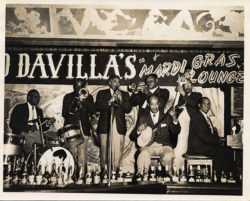Joe Robichaux
Traditional jazz and early rhythm and blues pianist Joe Robichaux may be best remembered as bandleader of the New Orleans Rhythm Boys.

Courtesy of Louisiana State Museum
Paul Barbarin Band. Unidentified
The nephew of early jazz talent John Robichaux, traditional jazz and early rhythm and blues (R&B) pianist Joseph Antoine Robichaux may be best remembered as bandleader of the New Orleans Rhythm Boys. Robichaux was a versatile performer who would later serve as a house pianist for Imperial Records and play an important backing role on a number of R&B classics. At the end of his career, Robichaux appeared frequently with George Lewis at Preservation Hall.
Robichaux was born on March 8, 1900, in the Irish Channel neighborhood of New Orleans (in discographies, his surname is usually misspelled as “Robechaux”). Born into a well-known musical family, young Joe was greatly influenced by his uncle John, who sometimes rehearsed with his band at Joe’s family home. By age seven, Robichaux had begun experimenting with piano; by high school he was studying the playing style of Steve Lewis, a pianist who performed with the A. J. Piron orchestra. Robichaux was also influenced by the Irish Channel pianists Lawrence Cook, Oscar Desdunes, Fred Washington, and a mysterious figure who went by the name “Game Kid.” (Although Jelly Roll Morton mentions “Game Kid” in his Library of Congress interviews, not much is known about this musician, including his real name.)
While attending New Orleans University, Robichaux began playing piano for house parties. His first serious gig would come with the O. J. Beatty Carnival in 1918 and would be followed by stints with trumpeter “Tig” Chambers in Chicago and Evan Thomas’s Black Eagle Band in Crowley, Louisiana, in 1922 and 1923. Upon his return to New Orleans in the mid-1920s, Robichaux began playing regularly with Lee Collins and Dave Jones, which resulted in the Jones and Collins Astoria Hot Eight band recording for the Victor label in 1929. This was an early racially integrated recording session featuring a white clarinetist named Sidney Arodin. The Victor recording included one of Robichaux’s own compositions, “Tip Easy Blues,” on which his piano work includes irregular rhythms and unique chording.
In 1931 Robichaux formed his own six-piece band, Joe Robichaux and His New Orleans Rhythm Boys. In 1933 the group traveled to New York to record. With their fast, explosive sound, these sessions were largely out of character for the typical music of that era.
The group returned to Louisiana and, during the remainder of the 1930s, expanded to fourteen or fifteen pieces––and at one time included Earl Bostic––to become New Orleans’s foremost swing band. The ensemble toured extensively, including a brief stint in Cuba, and recorded for the Decca record label in 1936, though these recordings were never issued. After the band dissolved in 1939, Robichaux became a solo pianist. During this time he worked occasionally with his uncle John’s orchestra and began a long musical partnership with the vaudevillian singer Lizzie Miles, who favored Robichaux as an accompanist.
In the early 1950s Robichaux was a house pianist for Imperial Records and thus played an important supporting role in a number of rhythm and blues sessions. In the late 1950s and 1960s Robichaux performed regularly with George Lewis’s ensemble, replacing Alton Purnell. Robichaux would later tour Europe and Japan with Lewis’s band. At Preservation Hall Robichaux appeared most frequently with Lewis, though he performed with a number of others as well, including John Casimir and Kid Howard.
Robichaux died of a heart attack on January 17, 1965, in New Orleans.
